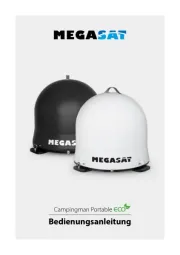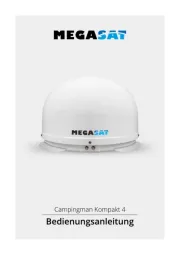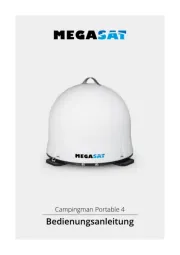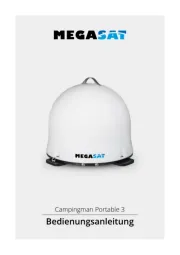Kathrein CAS 90ro Handleiding
Kathrein
Satellietantenne
CAS 90ro
Bekijk gratis de handleiding van Kathrein CAS 90ro (26 pagina’s), behorend tot de categorie Satellietantenne. Deze gids werd als nuttig beoordeeld door 78 mensen en kreeg gemiddeld 5.0 sterren uit 39.5 reviews. Heb je een vraag over Kathrein CAS 90ro of wil je andere gebruikers van dit product iets vragen? Stel een vraag
Pagina 1/26

1 / 36
■Refl ector made of aluminium, powder coated
■Feed system support made of galvanised sheet steel,
powder coated
■Mast clamp made of sheet steel, hot-dip galvanised
■Optimal electrical data combined with very compact mecha-
nical dimensions due to o set feed
■Patented tilt facility at the multi-feed adaptor plate, allows
optimisation of the LNB positions for multi-feed reception
■
Items supplied: Refl ector, pre-assembled mast and
feed system support, user manual
■The optimum performance of the satellite antennas is only
given in conjunction with the original Kathrein LNBs.
Features
■Without additional components, two universal feed systems
to receive the signals of satellites 3° or 4°
(e.g. ASTRA 19.2°/23.5°) or 6° apart (e.g. ASTRA/EUTELSAT-
HOTBIRD) can be mounted on the boom
For other satellite spacings, the multifeed adapter plates ZAS
90 (Order no: 218684) and ZAS 1218 (Order no: 204500011) are
available (see „Optional Accessories“ on page 1).
The CAS90 parabolic antenna is intended solely for the reception of satellite signals use as a domestic antenna and for only .
DIN4131 specifi es that a domestic antenna has no more than 6 m free mast length and a fi xed-end moment up to 1650Nm.
It is unsuitable for mounting on structures that are liable to vibration.
Make absolutely sure that the values for the maximum load listed in the Technical Data (on the last page) are complied with.
If this load is exceeded, parts could break away!
The CAS90 parabolic antenna is designed for use with a feed system (LNB) for reception of the signals from one satellite position, or
two feed systems for multi-feed applications for reception of the signals from two satellite positions with 3°–4° or 6° satellite spa-
cing.
When the additional ZAS 90 or ZAS 1218 multi-feed adapter plate is used, the parabolic antenna is also suitable for three feed sys-
tems. The feed systems and instructions for their installation are not included in the scope of supply of the parabolic antenna.
Do not use the parabolic antenna for purposes other than those listed in this manual! Any use other than that specifi ed
above will void the warranty or guarantee.
In particular, any of its or never modify components fi t any components other than those expressly intended by the
manufacturer for use with the antenna.
Breach of these rules may lead to the antenna no longer being suffi ciently stable and safe!
Intended Use
CAS 90gr 20010033
CAS 90ro 20010034
CAS 90ws 20010035
Sat Antennas
Optional Accessories
■ZAS 90, order no. 218684 multi-feed adapter plate
Installation items 2 and 3 cannot be mounted
at the same time.
■ZAS 1218, order no. 204500011 multi-feed adapter plate
Without notches for any satellite spacing

2 / 36
●Under no circumstances install antennas in the vicinity of overhead power cables, otherwise the absolutely essen-
tial clearance requirements may no longer be satisfi ed. Maintain a clearance of at least 1 m from all other electrical
devices in all directions!
If you or metal parts of the antenna touch any electrical device there is a serious risk of a fatal electric shock!
●Never work on antenna systems during a thunderstorm or when a thunderstorm is approaching.
There is a risk of a fatal electric shock!
●Never install antennas on buildings with easily fl ammable roof coverings such as straw, reeds or similar materials!
Otherwise there is a risk of fi re due to atmospheric over-voltages (static charges) or lightning discharges
(e.g. during thunderstorms).
●The installation operations described here assume good craftsmanship capabilities and knowledge of the behaviour
of materials under the e ects of wind. Therefore if you do not possess the required skills, have this work performed
by a specialist.
●The person doing the work must wear strong non-slip footwear, must not be liable to dizziness, must be able to
move around safely on the roof and have a secure standing and attachment position (if necessary, wear a safety
harness when on the roof).
●Make sure that the roof is able to bear your weight. Never walk on fragile or unstable surfaces! In case of doubt,
contact a qualifi ed specialist dealer or specialist roofi ng contractor to fi nd an appropriate installation location.
●Do not go on to roofs or other high places without a correctly attached safety harness that is in good condition.
Otherwise use a work platform.
●Ladders or other means of climbing must be in faultless condition (dry, clean and non-slip). Never build any
irresponsible “scrambling towers”!
●If there is a risk that passers-by may be injured by items falling from above during installation, you must close o
the risk area using barriers! Make sure that no-one is underneath the installation location.
Risk of death or injury due to falling from the roof, falling through the roof and falling parts, plus the
possibility of damage to the roof.
●The respective national safety regulations and current standards such as DINEN60728-11 should be complied with.
●Any other use or failure to comply with these instructions will result in voiding of warranty coverage.
Basic Safety Instructions
Before you install, connect or use the parabolic antenna, !make sure that you comply with the instructions in this manual
If you disregard these instructions,
●malfunctions may arise, creating to your life and health,risks
●defects in the installation or the connection may cause to the antenna or to the attachment point,damage
●the manufacturer will for malfunctions and damage arising!not accept liability
When working on antenna systems, please remember your duty of care towards your fellow human beings!
Keep the manual for any questions that arise later, and if the building passes to another owner, pass it on to the new owner!
Selecting the Installation Site
It is essential to select the correct installation site. This determines whether your parabolic antenna can be erected safely and per-
form to its optimum capabilities.
When selecting the installation site, take account of special features of the structure of the building. If the installation is at the edge
of the roof or the building or on a cylindrical structure, DIN 1055, parts 4 and 4131 specifi es the increased wind and vibration loadings
that should be allowed for. The dynamic properties of the antenna and the structure can mutually infl uence each other and cause
detrimental changes.
When installing (e.g. under eaves), due to the o set angle of the antenna, there must be a clear view to the satellite at an angle of
approx. 60° above the top edge of the refl ector in relation to the horizontal.
Disregarding these considerations can lead to the maximum load or vibration fatigue stress listed in the Technical Data being excee-
ded. , since the requirement is not height as such but an The parabolic antenna need not necessarily be mounted on the roof
unobstructed “view” of the satellite. For this reason, an appropriate installation site might also be found for instance in the garden, on
the terrace, on the face of the building or on a garage.
In fact if other sites are possible, it is better to avoid the roof. This will result in less work for you and will reduce the hazards asso-
ciated with installation work on the roof!

3 / 36
●For good reception, an unobstructed “view” to the south
(±20°) must be ensured, at an elevation of about 30°. The fol-
lowing satellites are then available for selection:
1 TÜRKSAT*) 42° East 6 EUTELSAT
HOTBIRD
13° East
2 ASTRA 2 group*) 28.2° East 7 EUTELSAT W 1 10° East
3 ASTRA 3 group 23.5° East 8 HISPA-Sat 30° West
4 ASTRA 1 group 19.2° East
5 EUTELSAT W 2 16° East
●Do make sure that there are no obstacles between the para-
bolic antenna and the respective satellite (such as trees,
roofs, house eaves or other antennas). Such items can impair
reception to the extent that during unfavourable stormy wea-
ther the signal is lost altogether.
*) The reception is dependent upon the respective location and the satel-
lite coverage zone
Installing the Antenna
When installing the antenna carrier (mast or wall boom), ensure
that it is standing upright. Otherwise, there may be problems
with the alignment of the antenna to the satellites.
a. Requirements on the antenna carrier
– Use only specially desi- masts or support tubes that are
gned for installation of antennas. Other tubes generally
do not have the strength required to withstand the forces
of wind and weather.
–For , select a tube diameter betweenmast installation
48 and 90 mm, with a wall thickness at least 2 mm. For
wall installation, Kathrein recommends the use of ZAS62
or ZAS63 wall supports.
–For mast installation on a roof, the mast must be clam-
ped for at least 1/6 of its free length (in the example
bottom right this is 0.7m).
b. Several antennas on a single antenna carrier
–Install the parabolic antenna the mast as as far down
possible, so as to minimise the bending moment at the
clamping point.
–Under no circumstances exceed the maximum value for
the on the mast or mast support, as stated in the loading
Technical Data. Su cient cognizance of the maximum
loading is achieved if you arrange your antenna system
as shown in example bottom right and use conventional
domestic antennas together with mast components from
a specialist supplier (tube in steel grade St 52 with out-
side diameter 60 mm and wall thickness 2.5 mm at the
mast clamping point – e.g. ZSH59 from Kathrein).
Ø 48–90 mm
If you arrange the structure di erently you must calculate wind loading and bending moment at the clamping
point as specifi ed in DINEN 60728-11 (or have a specialist do the calculation for you).
South
East West
Centre of the
reflector
Product specificaties
| Merk: | Kathrein |
| Categorie: | Satellietantenne |
| Model: | CAS 90ro |
| Kleur van het product: | Brown, Red |
| Gewicht: | 9900 g |
| Breedte: | 967 mm |
| Gewicht verpakking: | 13500 g |
| Hoogte (max): | 1030 mm |
| Diameter: | 900 mm |
| Afmetingen verpakking (BxDxH): | 1050 x 1050 x 230 mm |
| Materiaal: | Aluminium |
| Antenne versterkingsniveau (max): | 39.6 dBi |
| Frequentiebereik: | 10.70 - 12.75 GHz |
Heb je hulp nodig?
Als je hulp nodig hebt met Kathrein CAS 90ro stel dan hieronder een vraag en andere gebruikers zullen je antwoorden
Handleiding Satellietantenne Kathrein

1 Mei 2023

17 April 2023

30 Maart 2023

17 Maart 2023

5 Maart 2023

17 Februari 2023

26 Januari 2023

25 Januari 2023

27 November 2022

10 Oktober 2022
Handleiding Satellietantenne
Nieuwste handleidingen voor Satellietantenne

5 Juli 2025

5 Juli 2025

4 Juli 2025

4 Juli 2025

2 April 2025

2 April 2025

29 Maart 2025

29 Maart 2025

29 Maart 2025

29 Maart 2025